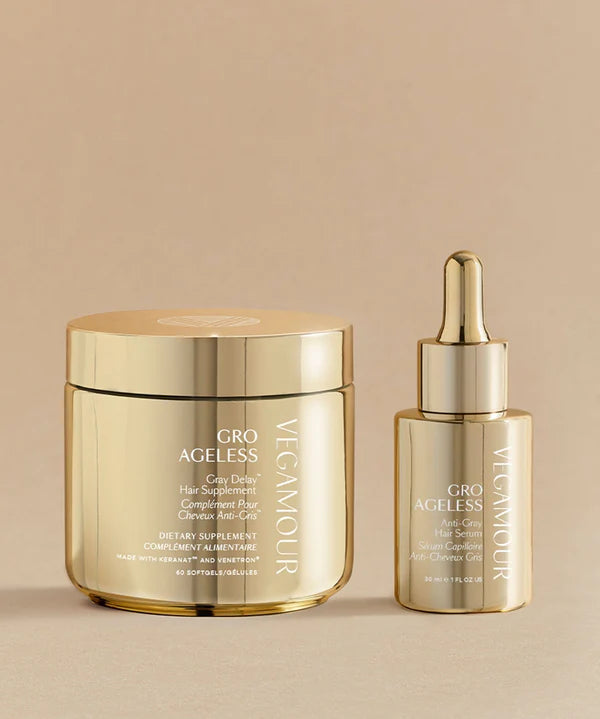Those first gray hairs can come as quite a shock. You might stare at them in the mirror, consider a panic trip to the salon or grab the tweezers. However, there's a lot more going on with gray hair than your existential crisis, and VEGAMOUR spoke with the experts to find out what you can do about it.
Take a breath. Here's why hair loses its melanin — plus, what products you should really be using to combat gray hair.
How Gray Hair Forms
The gray color you see in your hair is not the result of new "gray" color pigments. Instead, it's the absence of your hair's natural color pigments, which give your strands a gray or white appearance. Melanocytes in the hair produce melanin that gives your hair its natural color. There are two types of melanin: eumelanin (producing dark colors of hair) and pheomelanin (producing light colors of hair). Melanocyte stem cells function as a kind of reservoir feeding the production of melanin, which creates the natural hair color you see.
Over time, (or with certain stimuli), these melanocytes either slow in the production of melanin, creating a blended gray color or stop producing melanin altogether, resulting in white hair.
Factors in the Hair Graying Process
Genetics plays a role in when gray or white hair first appears, most commonly around age 35. In general, about 50% of people are 50% gray by the age of 50, called the 50-50-50 rule, though this is a generalization not based on scientific fact.
Here are some factors that are known to speed up the graying of your hair:
- Genetics and the natural aging process
- Stress or shock
- Biological conditions such as vitiligo, thyroid disease, alopecia areata, tuberous sclerosis and neurofibromatosis
- Nutrition (most notably, lack of vitamin B-12, vitamin B-9 or folic acid)
- Oxidative stress to the hair caused by free radicals in the environment, pollutants and toxins.
From hair care products to nutrition to natural home remedies, here's how you can slow down the graying of your hair. Also, we'll share with you VEGAMOUR's new GRO AGELESS Collection, which helps address the underlying causes of premature graying of the hair, maintain a healthy ecosystem at the scalp and provide critical nourishment to melanocytes.
From hair care products to nutrition to natural home remedies, here's how you can slow down the graying of your hair.
How to Control & Delay Gray Hair
The new GRO AGELESS Collection haircare options tick the boxes for those wanting to both prevent hair graying and make hair overall beautiful and healthy, gray or not. These advanced products use the latest in hair technology for the prevention and delay of graying while nourishing hair pigment.
GRO AGELESS Gray Delay™ Hair Supplement
GRO AGELESS Gray Delay™ Hair Supplement provide up to 140% increase in collagen production over the course of 12 weeks, nourishing your hair follicles from the inside out by helping to maintain melanin levels and reduce hair fall.
The supplement contains vitamin D as cholecalciferol, vitamin B-6 as Pyridoxine HCL and vitamin B-12 as methylcobalamin. It also contains iron, zinc, selenium, and a proprietary blend of Kerenat (which supports thickness, shine), 5HTP (from Griffonia simplicifolia) GABA, PABA, Fo-Ti root powder, Venetron (which supports healthy sleep, sleep maintenance and relaxation) and L-theanine.
These gray-delay capsules are clean, 100% certified vegan and cruelty-free.
GRO AGELESS Anti-Gray Hair Serum
GRO AGELESS Anti-Gray Hair Serum reduces the appearance of gray on new hair growth and helps restore color and shine to graying strands. This serum increases melanin (up to 127% in 12 weeks) and supports the melanin-producing actions of the melanocytes — even helping to re-pigment gray hair! In clinical studies, the serum boosted the appearance of natural hair color up to 34% in 79% of grey hairs.
Here's how to use this ground-breaking, gray-away formula:
- Fill dropper.
- Massage one dropperful directly onto dry or towel-dried scalp.
- Leave-in, and style as usual.
What Can You Do About Gray Hair?
For some people, having their hair turn gray is just as frightening or upsetting as hair loss. Thankfully, today, there are more options to help slow the appearance of those gray strands or enhance them — whichever you prefer.
Here's how to switch up your hair care routine.
Boost Collagen Production
One way to keep those melanin-producing cells well-nourished is to boost collagen production. Collagen is rich in amino acids like glycine, proline and hydroxyproline, and it aids in the production of keratin which is the foundation for healthy and strong hair.
Collagen also provides antioxidative care, which can help protect the hair from oxidative stress, which is a precursor for gray or white hair progression. While collagen production slows around the age of 25, it can be supplemented through targeted hair care which provides that extra collagen boost the hair follicles need.
Increase Melanocyte Production
You can also help hair follicles produce more melanin or boost melanocyte production. Consider the following suggestions:
- Eat foods rich in copper, such as crabmeat, almonds, almond oil, lentils, peanuts, beef liver and white mushrooms.
- Eat foods rich in antioxidants such as blueberries or leafy greens.
- Eat foods with vitamin A, vitamin E, vitamin D, vitamin B-6, vitamin B-12 and vitamin C (which raises glutathione in red blood cells). A vitamin B-12 deficiency, in particular, is connected with premature hair graying.
- Boost the hair cells with targeted hair care that helps slow hair graying.
Learn: What You Should Know About Hair Structure and Composition
What Do the Experts Say?
VEGAMOUR asked the experts how to combat the early graying of hair or how to best bring out the "wow" in those silver strands.
Dr. Daniel Boyer of the Farr Institute said that studies show that supplementing vitamins B-6, B-12, biotin and vitamin D can help combat early graying. He also cautioned against smoking: "Smoking enhances premature graying of hair and is backed by some scientific research, including a report in the Italian Dermatology online journal, published in 2013."
Boyer also recommended taking antioxidants to manage free radicals that cause damage to cells in the body, including hair follicles.
What About Natural Remedies?
Some people prefer to try natural home remedies. You can work to reduce stress, have your doctor screen you for vitamin deficiencies, avoid smoking or simply cover up the gray with henna-based hair color.
Other natural remedies may also help, though the scientific studies are not conclusive. For example, Ayurvedic tradition suggests Indian gooseberry (Amla) and fenugreek as a home treatment, though scientific studies do not seem to support this claim. And Kombucha tea, Manchurian mushroom or black tea are hailed as solutions for graying hair and a host of other applications, though research does not seem to support these claims either.
Also: How to Keep Your Hair Healthy as You Age
Embracing Your Gray Hair
Less melanin doesn't have to mean less beautiful. It's super-trendy right now to show off gray hair, ignoring melanin production and pigment cells and focusing more on having beautiful, healthy hair.
If you choose to embrace your gray hair, use hair products like a hair serum that promotes thicker, fuller looking hair, like GRO Hair Serum, made with powerful phyto-actives, which increase the appearance of hair density.
Caring for Hair Is Important – No Matter What
No matter what color your hair is, it should be beautiful, healthy and have a radiant shine. And the best approach to achieve those goals is a holistic one. Eat a healthy diet, stay hydrated, exercise and keep stress levels in check. Also, consider VEGAMOUR hair care products, which are vegan, toxin-free and clinically proven to help get you the results you're looking for.
#include-related-slider#
More From VEGAMOUR
- How to Reverse Gray Hair
- Why Some People Get Gray Hair Earlier Than Others, According to a Dermatologist
- Shop Courtney Kerr's VEGAMOUR Picks
Photo credit: Jonathan Borba/Unsplash
Back



















